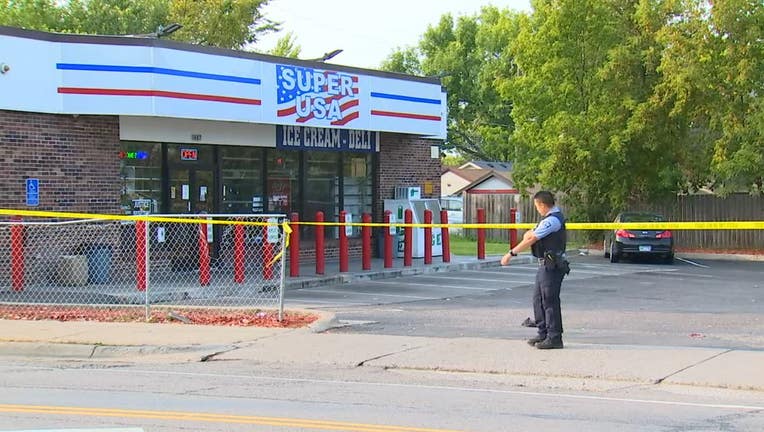Minneapolis community mourns loss of 17-year-old killed in shooting, no arrests made

A 17-year-old was shot and killed at the intersection of intersection of Fremont Avenue North and Dowling Avenue North in Minneapolis on Monday, Sept. 14, 2020 (FOX 9)
MINNEAPOLIS (FOX 9) - Community members are mourning the loss of 17-year-old Andre Conley, who was fatally shot Monday in Minneapolis.
According to police, the teen was shot at the intersection of Fremont Avenue North and Dowling Avenue North at about 4:27 p.m. Another person was shot and was taken to the hospital in serious but stable condition.
The suspects in the shooting fled prior to the arrival of police. No arrests have been made.

Minneapolis community mourns loss of 17-year-old killed in shooting
A community is mourning the loss of a 17-year-old boy who was shot in north Minneapolis.
Conley was also an intern for Republican congressional candidate Lacy Johnson's campaign, a campaign aide said. The 17-year-old was not doing campaign activities when the shooting happened.
“It is shocking and unnecessary acts of violence like this that prove why change is more needed than ever in our community," the campaign said in a statement to FOX 9.
Johnson is challenging Rep. Ilhan Omar in Minnesota’s Fifth Congressional District in the November general election.
Letter to staff from Minneapolis Public Schools Superintendent Ed Graff:
This evening the MPS family is grieving. Once again, one of our principals had to start today notifying his staff and students of the death of one of their school’s 12th graders due to gun violence in the community. Three weeks ago, we lost a 17-year-old female student, and two weeks before that another MPS student was killed in what has been a relentless and devastating spate of violence this summer in Minneapolis.
I know it is late, but I have spent much of the day processing how to retain my own hope in what feels like an overwhelming sea of despair. I have tried to think through what I can do or say that might pierce the apathy that seems to have taken hold in our community; to fight the pull toward becoming numb rather than wrestle with the sorrow, frustration and anger that comes with each report of one of our students being injured or killed. Ultimately, while I still don’t have answers that seem adequate, I am compelled to acknowledge what is happening here and nationally that continues to contribute to heightened trauma in the communities we serve - especially the African American community.
It is this constant triggering of anger, fear and othering that many of our young Black men – frankly many of our students of color and Indigenous students – bring with them to school whether virtually or in person. I urge staff to allow space for them, and all our students, to give voice to how all of this is impacting them. Please.
The ongoing violence in our community will have both short- and long-term consequences for our city because these young people are not just our future; these young people are valuable, contributing members of our community right now. Schools are one piece of the puzzle, and we will do all we can – even amid this pandemic – to help our youth feel respected and valued and cared for. But we cannot do it all. I ask you to join with me in calling for, and supporting, a broad spectrum of community interventions to end this cycle of violence and trauma that impacts so many of our students.
I want to applaud the dozens of MPS principals who stood in solidarity this afternoon at the site of the latest shooting, praying and declaring that enough is enough; that the violence must stop, and our children must be protected.
I know that COVID-19 has disrupted many rituals and routines for our students. And while we are in distance learning, I believe there are things we can do to support students and staff experiencing trauma. Julie Young Burns, the District’s Social and Emotional Learning Lead, offers this insight as we think through our approaches:
“It is important to remember that in MPS, we have committed to hold up the work of Dr. Shaun Ginwright, in his piece “The future of healing: shifting from trauma centered care to healing centered practices<https://medium.com/@ginwright/the-future-of-healing-shifting-from-trauma-informed-care-to-healing-centered-engagement-634f557ce69c>.”
She adds, “This important guidance reminds us that our students, families and community are much more than their ACEs scores or zip code, that they are not broken and that, like all humans, are innately resilient. As in the definition above, Dr. Ginwright also points out the importance of naming how current systems themselves can be a place of re-traumatization unless we are mindful of how power, privilege and bias can impact the policies and practices used within a system of care or education.”
Together, we can work to change our system and to call for systems change throughout our city. We owe this to our students who have left us too soon, and to the thousands who remain in our care.
In solidarity on behalf of the children,
Ed Graff

